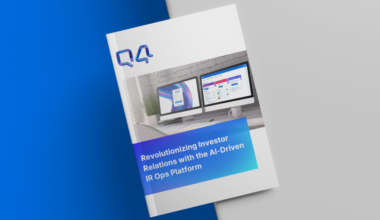Generative AI is a buzzworthy topic right now, particularly in investor relations, given its promise to enhance the work of IROs. You may have read about it, tried it, or have already adopted it into your daily workflow. An ever-growing list of generative AI tools can help you save time, identify key trends and insights, and provide a more informed, data-driven approach to your role.
Q4 partnered with IR Magazine on March 23, 2023, to host a webinar, “How Generative AI Could Disrupt Investor Relations.” It featured Peter Bonetta, Director of CRM & Investor Targeting Center of Excellence at Q4, Amit Sanghvi, Global VP of Capital Markets Platform at Q4, Deborah Belevan, VP of Investor Relations at Duolingo, and Christoph Greitemann, Senior Investor Relations Manager at Deutsche Telekom. The panel of experts focused on AI’s impact on IR and where it may lead in the future.
Current Business Uses of Generative AI
Many businesses have already adopted generative AI tools into their daily operations with varying levels of complexity. A live, in-webinar poll revealed that 28% of viewers have already experimented with generative AI.
Our panelists shared how they’ve started incorporating it into their daily roles:
- Duolingo uses Chat GPT-4 as a Slack integration to assist in creating content and synthesizing information from meetings, resulting in significant time savings.
- Deutsche Telekom has incorporated Chat GPT for creating social media posts and website copy.
- Q4 has adopted it to eliminate repetitive tasks IROs face daily. These include processing unstructured data, drawing insights and summaries from earnings calls, and categorizing questions.
Duolingo, in particular, is on the AI application fast track. With a CEO and Co-Founder with a Ph.D. in AI, the company has started using it to enhance its product offering. They recently partnered with OpenAI’s Chat GPT-4 to introduce Duolingo Max and develop new tools, including “Explain My Answer,” which provides grammatical tips for learners, and “Roleplay,” which allows learners to converse with a chatbot in potential real-life scenarios. She adds that Duolingo is exploring even more opportunities to use AI to scale faster, create content more quickly, teach better, and reach more learners worldwide.
Risks and Limitations
While the positive impact of AI is undoubtedly clear, this application of technology is in its early stages. As a result, there are limitations and risks to consider before fully adopting it as a primary tool for content creation and task replacement. These include considerations like confidentiality and security.
Peter Bonetta warns that users should remember that when asking questions or making requests, these tools are newly developed and trained on limited and recent data models. For example, he explains that predictive text tools aren’t necessarily scraping the web for real-time information and cannot link back to sources. In contrast, established and trusted search engines give additional answers, knowledge, and references.
Finally, he explains, there’s an increased risk of incorrect or false information disguised as reasonable- and plausible-sounding statements. There are also certain limitations with some AI applications; for instance, the inability to read Excel sheets or watch videos in addition to constricting word limits. That said, with some simple web searches, you can find an AI application that can perform almost any task you could imagine, and new use cases are released every day.
The Future of AI in IR
Knowing that AI has risks and potential shortfalls, the panelists discussed to what extent they would be happy using chatbots to provide information to their investors going forward. Deborah Belevan shared that, while a chatbot can save time answering common retail shareholder questions, there is little control in terms of input to ensure factual answers from reputable sources. She recommends having a frequently asked questions (FAQ) section on your website instead, which is more manageable and can yield more satisfactory answers. She further explained that nothing is more beneficial than a personable, two-way conversation with institutional investors; a chatbot can’t replace that.
When asked what they think the future holds regarding AI, the panelists all agreed that the sky’s the limit. As generative AI progresses and becomes more reputable, the future of investor relations may shift. How AI will help IROs, and humans will always be necessary to coordinate the interaction between the company and investor. A robot simply cannot replace personal interaction. AI will, however, continue to elevate the IRO role by identifying key trends and insights and providing a more informed and data-driven approach to their daily tasks, essentially saving time in a way we’ve not yet experienced. So, what will you do with yours?
To learn more about the applications of AI in investor relations, watch the recording here.
To explore Q4’s use of AI, explore our Capital Connect™ platform here.


